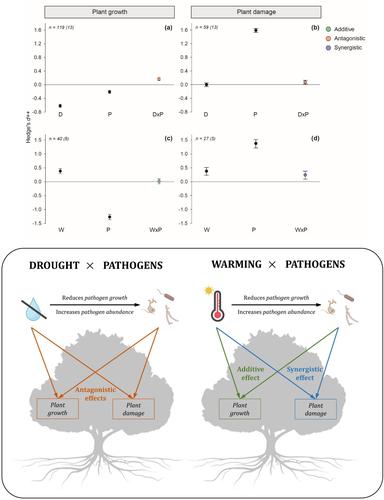当前位置:
X-MOL 学术
›
Glob. Change Biol.
›
论文详情
Our official English website, www.x-mol.net, welcomes your
feedback! (Note: you will need to create a separate account there.)
Interactive Effects of Climate Change and Pathogens on Plant Performance: A Global Meta‐Analysis
Global Change Biology ( IF 10.8 ) Pub Date : 2024-10-14 , DOI: 10.1111/gcb.17535 Blanca Gallego‐Tévar, Marta Gil‐Martínez, Antonio Perea, Ignacio M. Pérez‐Ramos, Lorena Gómez‐Aparicio
Global Change Biology ( IF 10.8 ) Pub Date : 2024-10-14 , DOI: 10.1111/gcb.17535 Blanca Gallego‐Tévar, Marta Gil‐Martínez, Antonio Perea, Ignacio M. Pérez‐Ramos, Lorena Gómez‐Aparicio

|
Plant health is increasingly threatened by abiotic and biotic stressors linked to anthropogenic global change. These stressors are frequently studied in isolation. However, they might have non‐additive (antagonistic or synergistic) interactive effects that affect plant communities in unexpected ways. We conducted a global meta‐analysis to summarize existing evidence on the joint effects of climate change (drought and warming) and biotic attack (pathogens) on plant performance. We also investigated the effect of drought and warming on pathogen performance, as this information is crucial for a mechanistic interpretation of potential indirect effects of climate change on plant performance mediated by pathogens. The final databases included 1230 pairwise cases extracted from 117 recently published scientific articles (from 2006) on a global scale. We found that the combined negative effects of drought and pathogens on plant growth were lower than expected based on their main effects, supporting the existence of antagonistic interactions. Thus, the larger the magnitude of the drought, the lower the pathogen capacity to limit plant growth. On the other hand, the combination of warming and pathogens caused larger plant damage than expected, supporting the existence of synergistic interactions. Our results on the effects of drought and warming on pathogens revealed a limitation of their growth rates and abundance in vitro but an improvement under natural conditions, where multiple factors operate across the microbiome. Further research on the impact of climate change on traits explicitly defining the infective ability of pathogens would enhance the assessment of its indirect effects on plants. The evaluated plant and pathogen responses were conditioned by the intensity of drought or warming and by moderator categorical variables defining the pathosystems. Overall, our findings reveal the need to incorporate the joint effect of climatic and biotic components of global change into predictive models of plant performance to identify non‐additive interactions.
中文翻译:

气候变化和病原体对植物性能的交互影响:全球荟萃分析
植物健康日益受到与人为全球变化相关的非生物和生物压力因素的威胁。这些压力源经常被单独研究。然而,它们可能具有非加性(拮抗或协同)相互作用效应,以意想不到的方式影响植物群落。我们进行了一项全球荟萃分析,以总结关于气候变化(干旱和变暖)和生物攻击(病原体)对植物性能的联合影响的现有证据。我们还研究了干旱和变暖对病原体性能的影响,因为这些信息对于解释气候变化对病原体介导的植物性能的潜在间接影响至关重要。最终数据库包括从全球范围内最近发表的 117 篇科学文章(从 2006 年开始)中提取的 1230 个成对案例。我们发现,干旱和病原体对植物生长的综合负面影响低于基于其主要影响的预期,支持拮抗相互作用的存在。因此,干旱的程度越大,病原体限制植物生长的能力就越低。另一方面,变暖和病原体的结合造成的植物损害比预期的要大,支持协同相互作用的存在。我们关于干旱和变暖对病原体影响的结果表明,它们在体外的生长速度和丰度受到限制,但在自然条件下有所改善,因为多种因素在整个微生物组中起作用。进一步研究气候变化对明确定义病原体感染能力的性状的影响,将加强对其对植物间接影响的评估。 评估的植物和病原体响应受干旱或变暖强度以及定义病理系统的调节因子分类变量的制约。总体而言,我们的研究结果揭示了将全球变化的气候和生物成分的联合效应纳入植物性能的预测模型中,以确定非加性相互作用。
更新日期:2024-10-14
中文翻译:

气候变化和病原体对植物性能的交互影响:全球荟萃分析
植物健康日益受到与人为全球变化相关的非生物和生物压力因素的威胁。这些压力源经常被单独研究。然而,它们可能具有非加性(拮抗或协同)相互作用效应,以意想不到的方式影响植物群落。我们进行了一项全球荟萃分析,以总结关于气候变化(干旱和变暖)和生物攻击(病原体)对植物性能的联合影响的现有证据。我们还研究了干旱和变暖对病原体性能的影响,因为这些信息对于解释气候变化对病原体介导的植物性能的潜在间接影响至关重要。最终数据库包括从全球范围内最近发表的 117 篇科学文章(从 2006 年开始)中提取的 1230 个成对案例。我们发现,干旱和病原体对植物生长的综合负面影响低于基于其主要影响的预期,支持拮抗相互作用的存在。因此,干旱的程度越大,病原体限制植物生长的能力就越低。另一方面,变暖和病原体的结合造成的植物损害比预期的要大,支持协同相互作用的存在。我们关于干旱和变暖对病原体影响的结果表明,它们在体外的生长速度和丰度受到限制,但在自然条件下有所改善,因为多种因素在整个微生物组中起作用。进一步研究气候变化对明确定义病原体感染能力的性状的影响,将加强对其对植物间接影响的评估。 评估的植物和病原体响应受干旱或变暖强度以及定义病理系统的调节因子分类变量的制约。总体而言,我们的研究结果揭示了将全球变化的气候和生物成分的联合效应纳入植物性能的预测模型中,以确定非加性相互作用。


















































 京公网安备 11010802027423号
京公网安备 11010802027423号